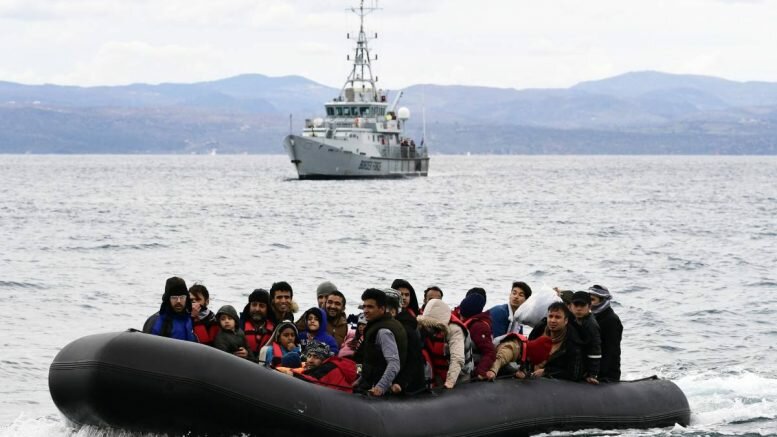The Social Democrats in Denmark want to export the asylum process to an African country, but the proposal has received strong criticism.
On Tuesday and Thursday, the Danish parliament will vote on a bill from Prime Minister Mette Frederiksen’s government. If it is passed, Denmark may, in practice, receive zero refugees in the future.
Tunisia, Ethiopia, Egypt, and Rwanda are countries that the government has negotiated with and which are seen as possible host countries for a reception for people from other countries and stateless people seeking asylum in Denmark, newspaper Jyllands-Posten writes.
Minister of Immigration and Integration Mattias Tesfaye visited Rwanda in April but emphasized afterward that no agreement has been entered into and no real negotiations are underway to establish a Danish asylum reception center in the country.
“We agreed to continue discussing refugee and asylum policy, but also development issues, investments, green change, tourism, and many other issues,” Tesfaye said in parliament in early May.
UN critical
The UN High Commissioner for Refugees (UNHCR) and the EU have criticized the Danish Social Democrats’ proposal.
“It will be one of the biggest changes in Danish asylum and refugee policy since 1951. That is why the UNHCR has very clearly and loudly distanced itself from and criticized this idea, something the EU has also done,” Martin Lemberg-Pedersen said. He is an associate professor at the Center for Advanced Migration Studies at the University of Copenhagen.
The UN and the EU believe that the proposal will undermine international cooperation if adopted. The proposal has also received massive criticism from Amnesty International, the Red Cross, and Save the Children.
“You cannot export the responsibility; you have to protect human rights. The bill is far too imprecise for us to assess it from a human rights perspective,” Louise Holck, director of the Danish Institute for Human Rights, said.
Faulty logic
One of the Danish government’s main arguments is that by establishing asylum reception centers in Africa, refugees are prevented from embarking on the dangerous journey across the Mediterranean, often under the auspices of cynical human traffickers.
The logic is faulty, however, as it should not be possible to apply for asylum at the reception center that is proposed to be established in Africa. Since the mid-2000s, there has also been no opportunity to apply for asylum at Danish embassies or consulates abroad.
“Asylum seekers must still travel all the way up to Denmark, across the Mediterranean and through Europe, before they can apply for asylum at the Danish border. Then they will be sent down to this third country for the asylum process,” Lemberg-Pedersen said.
If asylum is granted, the refugee must also not be integrated into Danish society but in the country where the reception is established or transferred to a refugee camp run by the UN. If the person in question has their application rejected, the country where the reception is located will, according to the proposal, be responsible for deportation.
To the right of the right
“It is not only the asylum treatment that is exported, but also the asylum stay. In fact, it can be said that this policy is against the integration of refugees, and it is very radical. In Denmark, many of the refugees we receive are from Afghanistan and Pakistan. Why should it be easier for them to integrate in Rwanda?” Lemberg-Pedersen asked.
If the Danish Social Democrats push their proposal through, it will mean that Denmark will no longer accept refugees who spontaneously seek asylum, only quota refugees from the UN.
“One can actually say that the Social Democrats have gone further and rounded the right flank in Danish politics with this proposal. This is more radical than what the right-wing parties argued for around 2014-2015,” Martin Lemberg-Pedersen said.
Previous Israeli experiment broke down
The idea of moving the asylum process to third countries outside Europe is not a new invention or something that Danish politicians alone have come up with.
“The idea has also been aired in the UK and the Netherlands, and in the years 2013 to 2017, Israel had an agreement with Rwanda and sent around 4,000 Africans to the country. That agreement quickly broke down, and many of them later traveled to Europe or other countries. Instead of undermining the human trafficking industry, they just put on another layer of exploitation,” Lemberg-Pedersen said.
He does not think other countries will be willing to take on such a large responsibility as the Danish proposal provides.
“This is one of the main reasons why such proposals have not been realized since the 1980s,” he added.
Expensive system
The government’s proposal for a new asylum system will also be very expensive for the Danish state, critics say.
In addition to expenses related to the establishment of asylum reception centers abroad, the deportation system must also be expanded.
“It is no longer only those who are refused asylum who are to be sent out, but everyone who enters the asylum system,” Lemberg-Pedersen said.
Source: © NTB Scanpix / #Norway Today / #NorwayTodayNews
Do you have a news tip for Norway Today? We want to hear it. Get in touch at [email protected]






Leave a comment